Content
- What salivation is considered abundant
- How to understand that salivation is increased: symptoms and signs of failure
- Causes of excessive salivation in adults
- Physiological factors
- Mechanical irritation of the oral cavity
- Dental diseases
- Diseases of the gastrointestinal tract
- ENT diseases
- Helminthic invasions
- Neurological pathologies
- Complications of pharmacotherapy
- Rare causes
- Causes of excessive salivation during sleep
- Help before diagnosis
- Diagnostics
- Treatment
- Medication
- Botox
- Facial massage and muscle relaxation
- Removal of glands
- Folk ways
- Video about increased salivation
Saliva is a special type of digestive fluid that is produced by the salivary glands located in the thickness of the oral mucosa. The secretory fluid is necessary for moisturizing the mouth and food, it is saturated with biologically active substances.
With excessive formation of saliva in an adult, its outflow begins, and the process profuse salivation (hypersalivation) becomes a sign of various diseases. To get rid of an unpleasant symptom, you will have to cure its cause, because salivation is considered a normal process only in infants.
What salivation is considered abundant
The role of saliva is extremely important not only for the digestive system, but also for the health of the teeth, which it strengthens and nourishes with calcium, washing away food debris from them. However, an excess of biologically active fluid, as well as its lack, indicates a malfunction of the body's functions. Therefore, it is important to know how much salivary secretion is considered normal.
In adults, 3 pairs of salivary glands (sublingual, parotid and submandibular) produce from 1.5 to 2 liters of saliva per day. Exceeding these volumes suggests the presence of pathologies.
The rate of secretion may vary depending on age (in the elderly, the rate of salivation slows down), the strength of food stimuli, and the level of nervous excitement. In addition, the secretion process slows down during sleep (almost 10 times lower), and the normal rate of saliva production during wakefulness is 0.05-0.5 ml per minute. Due to the stimulation of the secretory process, its rate can increase to 2-2.5 ml / min.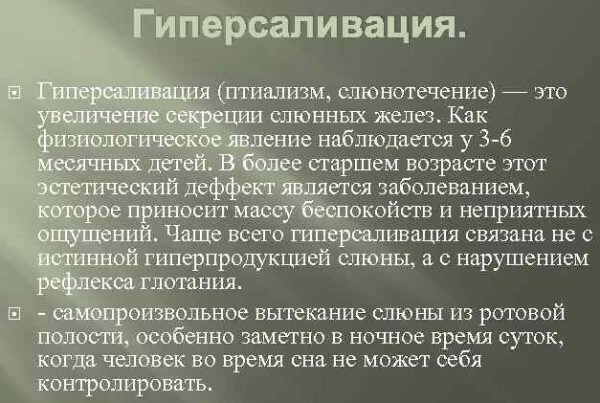
All salivary glands secrete their own secret of a certain composition into the oral cavity. Fluids from the salivary ducts mix with each other in the mouth, forming saliva, saturated with a specific microflora, epithelial cells, leukocytes and mucus.
How to understand that salivation is increased: symptoms and signs of failure
In adults suffering from hypersalivation, the volume of saliva flowing into the oral cavity can reach 10-12 liters, which interferes with social activity and provokes psychological breakdowns. If salivation is normal, a person pronounces words clearly, enjoys the taste of food and drinks, swallowing them without problems.
In the case of increased secretion, the usual processes fail, which provokes the appearance of a number of problems:
- diction suffers - speech becomes incomprehensible due to difficulties with the pronunciation of words and sounds;
- taste perception is disturbed - the food taken becomes too salty or sweet, the sensation of the taste palette disappears;
- while swallowing food, pain appears.
Profuse salivation in adults (the causes of discomfort can be different) is clearly noticeable by external signs - saliva is constantly oozing out of the mouth. The main criterion for ascertaining the failure of the function of the salivary ducts is the measurement of the volume of saliva secreted in 5 minutes. If the volume of fluid released has exceeded the established limit, the failure of salivation is considered a pathological condition.
Depending on the mechanism of development, the salivation process is classified according to two criteria:
| Type of | Short description |
| True | In adults, more than 2.5 liters of saliva are secreted per day. If the volume is even greater, we are talking about the development of hypersalivation. Failures in the work of the glands (salivary), the presence of nervous or mental disorders, reflex disorders from the digestive tract, and diseases of the oral cavity are assumed. |
| False | The volume of salivary fluid remains the same (up to 2.5 liters per day), but against the background of a feeling of increased saliva production. The reason is associated with the weakness of the facial muscles, which leads to the accumulation of fluid in the mouth with its possible outflow. As a result, the person thinks that he is actually making too much saliva. |
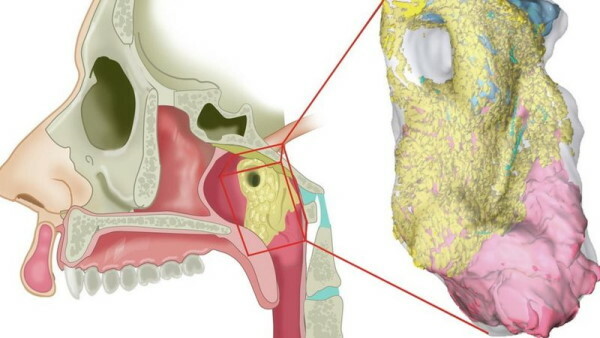 Until 2020, it was believed that adults have 3 paired salivary glands, but in October of the same year, scientists announced the discovery of the 4th pair. It was found in the space of the nasopharynx (posterior part), and the new type of glandular structures themselves were called "tubal" because of their external features.
Until 2020, it was believed that adults have 3 paired salivary glands, but in October of the same year, scientists announced the discovery of the 4th pair. It was found in the space of the nasopharynx (posterior part), and the new type of glandular structures themselves were called "tubal" because of their external features.
Causes of excessive salivation in adults
In healthy people, the volume of saliva produced increases with the onset of the digestion process, as well as from the appetizing appearance and tasty smell of food. When food enters the oral cavity, the nerve endings that permeate the oral mucosa react to it.
As a result, the volume of saliva production changes, which happens for 2 main reasons:
- due to the increased irritating effect on the nerve receptors that permeate the oral mucosa;
- due to stimulation of the center located in the brain, which provides reflex salivation.
If pathological processes in the body are not observed, then just so much salivary secretion is produced, to soften food, to ensure proper digestion, and to rinse off food debris from the surface teeth.
Physiological factors
Profuse salivation (in adults, the causes may be temporary) in some conditions is associated with physiology. For example, during a cold, when the nose is stuffy and the mucous membrane of the oropharynx is swollen. In the first weeks of pregnancy, women sometimes complain of heartburn and gag reflex (toxicosis) against the background of abundant saliva.
In this case, the reason for the outflow of fluid from the mouth is of a reflex nature due to hormonal changes that prepare the body for bearing a child. Usually, the symptoms of sialorrhea disappear after the first trimester and do not threaten the fetus, but they can signal a disease if the volume of saliva flowing out reaches 3-5 liters / day.
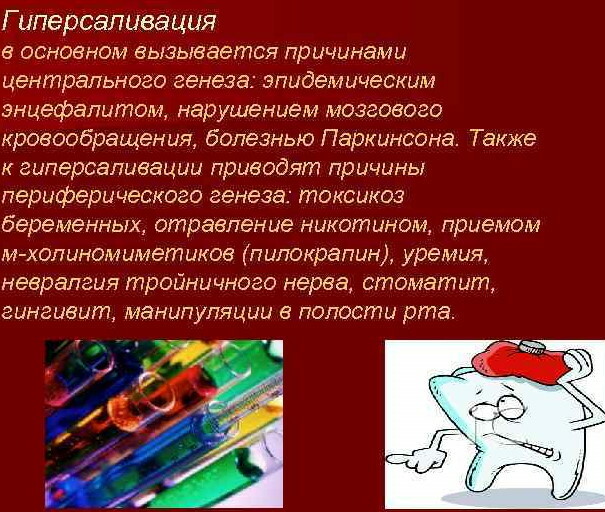
In newborns, drooling is not considered a pathology, as in children under one year old during teething (milk / permanent). Overproduction of saliva can be observed even in children under 4 years of age - this is also normal. As with adults, eagerly anticipating certain types of food or drink.
Mechanical irritation of the oral cavity
Adults and children who are forced to wear dental constructions in their mouths suffer from profuse salivation. It takes several months to get used to removable dentures or teeth straightening devices (braces, mouth guards). During this time, the volumes of salivary fluid produced first increase and then gradually return to normal.
External irritants that cause excessive saliva production include smoking and taking medications that irritate the mucous receptors. Smudges on the corners of the mouth are noted not only by people who are fond of chewing gum and sucking sweets, but also by patients of dental clinics.
Dental diseases
The development of sialorrhea is facilitated by the inflammatory process in the oral cavity, caused by the rapid multiplication of the bacterial flora. The ingress of bacteria into the ducts of the salivary glands leads to the release of more saliva to flush microorganisms from the mucous membrane.
Common diseases of the teeth and gums provoke hypersalivation:
- stomatitis - one of the types of inflammatory process that affects the oral mucosa;
- caries - the condition is accompanied by the formation of carious cavities with different depths of tooth damage;
-
gingivitis - a group of acute or chronic inflammations affecting the gingival mucosa.
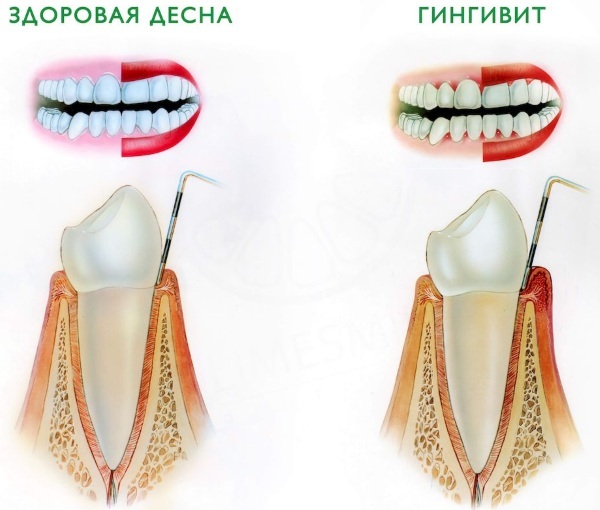
Abundant salivation with these pathologies worries adult patients most often at night. Throughout the day, the signs of sialorrhea are moderately expressed, they can be manifested by a slight outflow of salivary fluid. Dental diseases of various types are signaled by a variety of symptoms, but the causes of severe salivation associated with the irritating effect of the inflammatory process on M-choline receptors located in the thickness of the mucous membrane structures.
Diseases of the gastrointestinal tract
Symptoms of hypersalivation can warn of such diseases of the gastrointestinal tract:
- ulcer - the disease is associated with a local defect in the gastric mucosa, a place of damage or destruction of its tissues;
- pancreatitis - a whole group of diseases and symptoms caused by inflammation affecting the pancreas;
- cholecystitis - signs of an inflammatory process in the walls of the gallbladder, which disrupt the outflow of bile from it.
Overproduction of salivary fluid is most typical for chronic forms of these diseases. Patients suffer from profuse salivation not only at night, but also in the daytime, heartburn and a feeling of a third-party taste in the mouth join the unpleasant symptom. The most characteristic moment for gastric pathologies is salivation against the background of pain syndrome, accompanied by nausea and vomiting, and problems with stool.
ENT diseases
Abundant tear production accompanies pathologies of the nasopharynx due to difficulty breathing through the nose. In adults with chronic rhinitis or sinusitis, as well as with inflammation of the adenoids in children, the mouth is constantly open, since they feel difficulty with nasal breathing.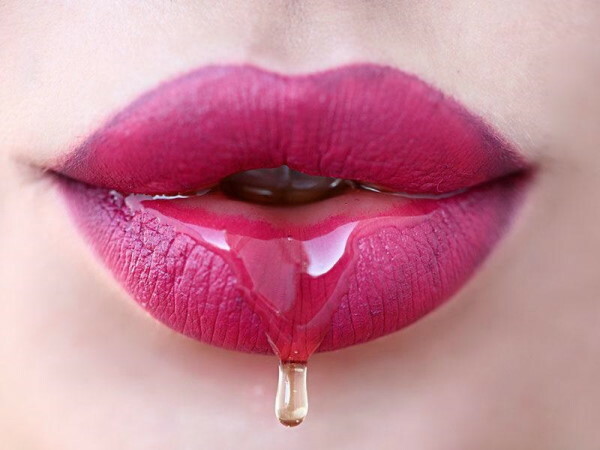 If during the day such patients deliberately try to swallow or spit out excess saliva, then during a night's sleep, the thickened liquid spontaneously flows out, causing the mucous membrane to dry out.
If during the day such patients deliberately try to swallow or spit out excess saliva, then during a night's sleep, the thickened liquid spontaneously flows out, causing the mucous membrane to dry out.
Helminthic invasions
The cause of parasitic diseases is the colonization of the gastrointestinal tract by helminths - round and rather large worms. The waste products of an ever-increasing colony of parasites irritate peripheral receptors, which activate the reflex of accelerated salivation. The characteristic signs of helminthiasis are: profuse saliva flow at night, as well as the formation of dried crusts at the corners of the mouth.
Invasions are acute and chronic. The traditional symptoms of hypersalivation are complemented by the characteristic signs of each of the forms. In the chronic course of helminthiasis, symptoms of mechanical injury prevail at the place of introduction of the parasite into tissue structures. This threatens the development of more dangerous diseases (stomach ulcer, purulent peritonitis, hepatitis, and others).
Neurological pathologies
Quite often, the causes of profuse salivation in adults are associated with disorders of the nervous system, which is explained by the involvement of salivary regulation centers in the pathological process.
The development of overproduction of salivary secretion is noted with the following neurological disorders:
| Pathological syndrome | Sialorrhea reasons |
| Parkinson's disease, cerebral tumors | Pathology of a degenerative nature is manifested by a number of disorders of motor activity (tremor, muscle rigidity, affects), including the formation of a large amount of saliva. Leakage of fluid from the mouth occurs when it becomes difficult for a patient to swallow due to a growing tumor. 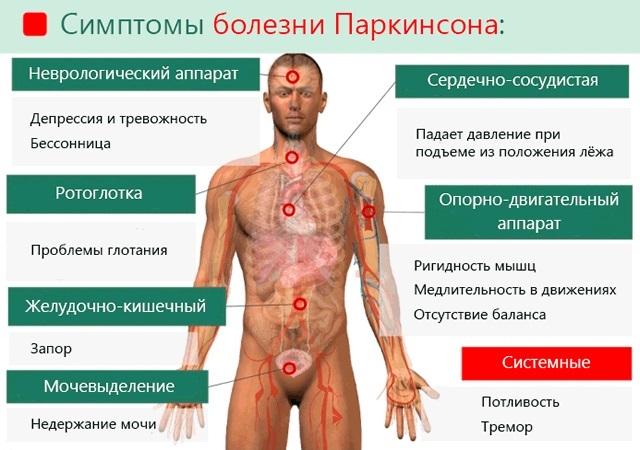 |
| Stroke, facial paralysis | Abundant salivation in adults, the reasons for which can be called catastrophic, pesters in acute cerebrovascular accident (stroke). Sialorrhea accompanies inflammation of the facial nerve, when insufficient lip closure leads to sagging of the buccal muscles. When the head is tilted to the side, saliva flows more strongly, but from one side. |
| Impaired swallowing and speech | Against the background of the underlying disease, dysphagia may develop - a secondary pathological process in which it is difficult to swallow solid food. Although saliva production does not decrease, automatic swallowing does not occur, and fluid secretion accumulates in the mouth and then flows out. Over time, the problem with swallowing is joined by a disorder of speech function, swallowing fluids. |
Complications of pharmacotherapy
A rare cause of excessive salivation can be a reaction to certain medications. Most often, this is the treatment of adults with M-cholinomimetics. Medications irritate the peripheral receptors that stimulate the salivary glands. From the first days of therapy with barbiturates, iodine preparations, neuroleptics, benzodiazepine derivatives, many patients complain of a symptom of uncontrolled salivation.
Rare causes
The cause of hypersalivation in women is associated with hormonal disruption during menopause, thyroid dysfunction, during hyperestrogenism. However, sialorrhea can be a congenital syndrome or a sign of mercury / lead poisoning, poisonous mushrooms.
In men, increased salivation is more often considered a psychogenic phenomenon - as a reaction to the female sex, accompanied by a sharp rise in testosterone concentration. Hypersalivation in adults is noted in schizophrenia, bipolar disorders, schizoaffective and catatonic syndromes.
Causes of excessive salivation during sleep
With the onset of the phase of too deep sleep, the body may confuse sleep with reality, then more saliva will be released - by analogy with daytime. Severe fatigue, malocclusion, deviated nasal septum, nasal congestion, allergies also become the cause of nighttime salivation. When the phenomenon turns into a pattern, you need to consult a doctor.
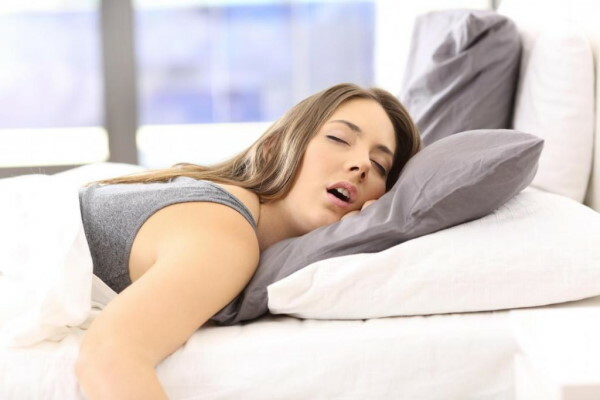
In addition, loud snoring often accompanies these conditions, especially if the sleeper is lying on his back.
Help before diagnosis
If saliva flows out in small amounts, the condition does not require treatment. To get rid of nocturnal sialorrhea, you just need to roll over on your side, then saliva will not interfere with breathing. To prevent irritation of the skin, the skin around the mouth can be lubricated with a nourishing cream at night, and during the day, drink more fluids to reduce the risk of dehydration.
We'll have to adjust the diet, excluding sweets, carbonated drinks, food with preservatives. For oral hygiene, it is better to choose a toothpaste with a little foaming.
Diagnostics
The treatment of diseases that have caused profuse salivation is carried out by doctors of various clinical directions. Therefore, first you need to contact a specialist of a wide profile - a therapist deals with adult patients, children are treated by a pediatrician. After a general assessment of health and specific complaints, the family doctor will refer you to a narrow specialist (neurologist, dentist, gastroenterologist, otolaryngologist), who will send you to undergo additional diagnostics.
The results of the research will help the doctor pinpoint the cause of the excess saliva flow in order to make a treatment regimen.
The range of instrumental and laboratory activities includes:
- Biochemical analysis of saliva to assess the presence of bacterial microflora. This will help the attending physician to identify the presence of gastrointestinal diseases, as well as dysbiosis.
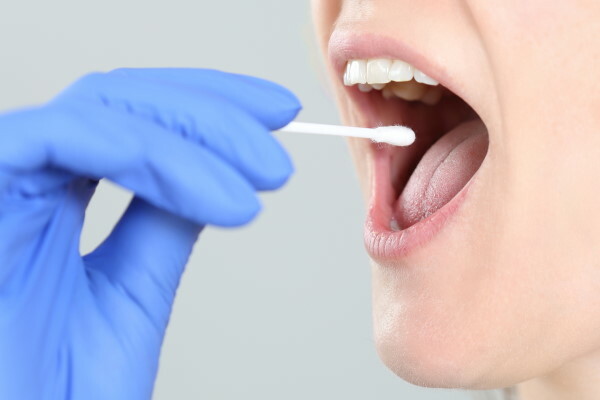
- From the group of general clinical studies, the results of a general blood test are needed to detect the inflammatory process, traces of infections. Stool analysis is necessary to exclude helminthiasis, urine analysis - diseases of the genitourinary system.
- Appointment of instrumental techniques is justified in case of complaints about malfunctions of the digestive system (X-ray, ultrasound). The results of a brain examination (CT, MRI) will help diagnose pathologies of the nervous system.
Profuse salivation in adults, caused by bacterial disease, is most often accompanied by bad breath. In almost 90% of cases, it is bacteria that become the culprits of the stench, because there are at least 300 varieties of them on the mucous membrane of the human mouth. Therefore, the treatment program in each specific case is compiled individually according to the results of diagnostics. There is no universal treatment for hypersalivation.
Treatment
The choice of a specific therapeutic regimen for getting rid of profuse salivation depends on the pathological condition provoking it. It can be a medication course or physiotherapy procedures in the early stages, in severe cases, surgical intervention is indicated.
Medication
In most patients, salivation resolves completely after the symptoms of the disease that caused the problem have been eliminated.
Adults suffering from sialorrhea for a specific reason will need to undergo a course of drug therapy with the following drugs:
- Overproduction of saliva is treated with M-anticholinergics, which inhibit the function of the salivary glands. The drugs Atropine, Riabal, Platyphyllin, Scopolamine have an extensive list of rather dangerous side effects, so a doctor should prescribe medications.
- The psychogenic form of excessive salivation is eradicated with tricyclic antidepressants. Medicines of this series, such as Amitriptyline, Clomipramine, Doxepin, are able to slow down the active secretion of saliva.
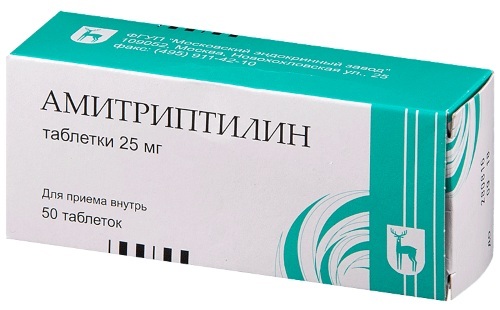
- If acute poisoning has become the cause of sialorrhea, an enhanced course of cleansing drugs is important. Helminths are expelled from the body by anthelmintics, focusing on the type of parasite. The choice of drugs for diseases of the dentition and gums depends on the type of dental problem.
If the patient has difficulty swallowing, he needs to stimulate the swallowing reflex. It is performed by the method of cryotherapy - cold treatment.
Botox
When conservative treatment does not show a positive result, an injection course of botulinum toxin is indicated for an adult patient. The introduction of botulinum toxin at the location of the parotid glands can temporarily block the impulses of nerve fibers that stimulate saliva production.
Facial massage and muscle relaxation
If the reason for the profuse salivation is in nervous overstrain, the influence of stress, or is associated with diseases of the central nervous system (central nervous system), it is worth turning to muscle relaxation techniques. The technique of gentle facial massage can remove muscle clamps, improve blood circulation and lymph flow in order to relieve the effect of mild inflammation of the salivary glands.
Removal of glands
In the case of complicated causes of a neurological nature, the problem of salivation is eliminated with the help of surgery.
A radical method of treatment (removal of the salivary glands) is indicated in the case of chronic inflammation of their tissues, if salivary stone disease, cysts, benign or malignant neoplasms are detected plan. Despite the effectiveness of resection of small glands, the consequences of the operation can be dire - facial asymmetry, impaired chewing and swallowing function.
Folk ways
For uncomplicated forms of hypersalivation (seasickness / air sickness, stress episode, medication), you can rinse your mouth after eating:
- infusion of highlander pepper - a tablespoon of the solution in a glass of water (warm);
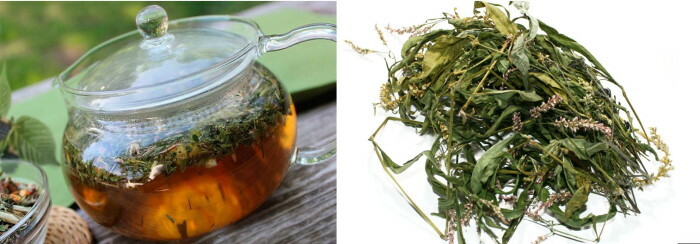
- brewed black tea with two tablespoons of mashed fresh raspberries;
- infusion of viburnum berries or sage herbs, which regulates the outflow of saliva.
The most common cause of salivation not only in children, but also in adults is respiratory and nasopharyngeal diseases (ENT). In addition to the main methods of treatment, physiotherapy is usually prescribed, it is UHF that can stop profuse salivation. You can reduce salivation by avoiding certain foods - bread and pasta, potatoes and pumpkins, and other starchy vegetables.
Video about increased salivation
Hypersalivation. How to help:
